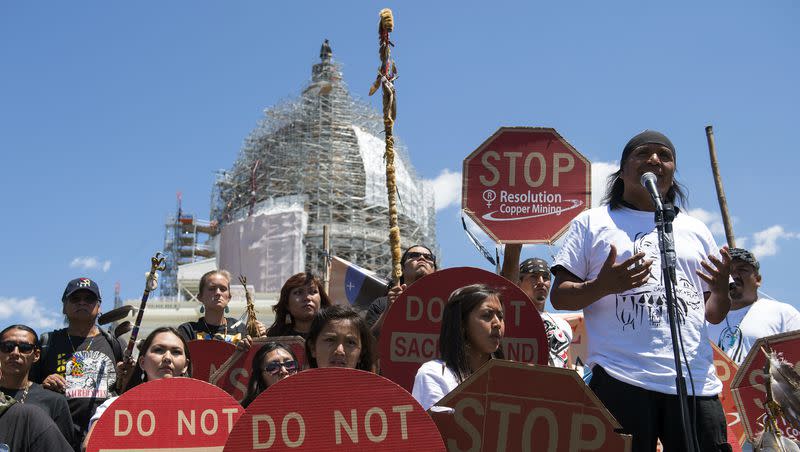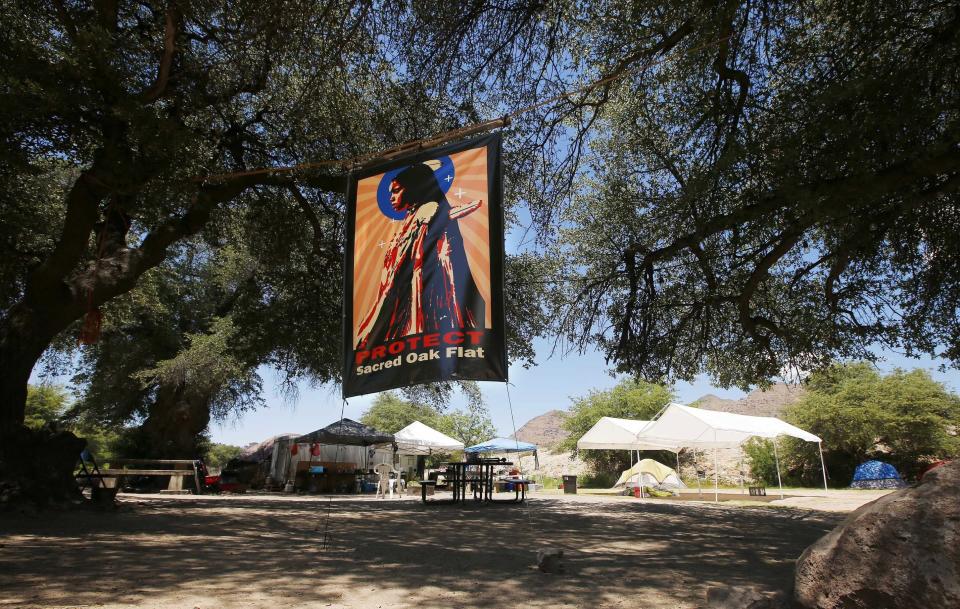Would this planned Western mining project violate religious freedom protections?

An Apache group was back in federal court Tuesday to fight against a mining project using religious freedom law.
The battle began in 2014, when the federal government agreed to transfer previously protected land in central Arizona to Resolution Copper as part of a land exchange.
Apache Stronghold, a coalition of Western Apache and other Native American groups, eventually sued to block the transfer, arguing it would destroy a sacred site called Oak Flat and trample their religious exercise rights.
“Since time immemorial, Western Apache and other native peoples have come to Oak Flat for essential religious ceremonies that cannot take place anywhere else,” explains a Nov. 17 press release from the Becket Fund for Religious Liberty.
Related
So far, Apache Stronghold’s effort to protect the land, which is also known as Chi’chil Bildagoteel, has been unsuccessful. The 9th U.S. Circuit Court of Appeals ruled against the group last June, determining that tribes were not substantially burdened by the planned mining project.
But the case is far from over and, depending on what happens after Tuesday’s hearing, it could easily end up in front of the Supreme Court in the next year or two.
Here’s what you need to know about Apache Stronghold v. United States and the historical relationship between Native Americans and religious liberty law.
What is Oak Flat?
Oak Flat is an area of land east of Phoenix near Superior, Arizona. It’s part of Tonto National Forest, which contains a handful of sites that are sacred to the Western Apache people.
Apache Stronghold wants to retain access to Oak Flat in order to continue harvesting medicinal plants and hosting religious ceremonies there, according to Religion News Service.
Why is Oak Flat threatened?
Until 2014, Oak Flat’s future seemed secure because it was owned and protected by the federal government. But that year, officials agreed to transfer it to Resolution Copper, which plans to extract the area’s substantial copper deposits.
“Under the (terms of the agreement), the Department of Agriculture must convey 2,422 acres of federal land, including Oak Flat, to Resolution Copper in exchange for 5,344 acres of Arizona land currently owned by Resolution Copper,” the 9th Circuit’s June ruling explains.
If the courts allow the land exchange to move forward, Resolution Copper would eventually start extracting copper from Oak Flat and other areas, which would permanently alter the landscape.
Other sacred sites in Tonto National Forest, including Apache Leap, would remain protected even after the land exchange, according to the June ruling.

Apache Stronghold v. United States
Although government officials, representatives of Resolution Copper and Western Apache leaders have long been in contact about how to protect Oak Flat amid planned mining projects, the parties have not been able to find a solution that addresses all key concerns.
That’s why Apache Stronghold filed the ongoing lawsuit against the federal government, which argues that the land transfer would violate religious freedom protections.
“The government protects historical churches and other important religious landmarks, and our site deserves no less protection,” said Wendsler Nosie Sr. of Apache Stronghold in Becket’s November press release.
So far, Apache Stronghold’s faith-based arguments have been unsuccessful. Judges at both the district and circuit levels have ruled against the group, deciding that the land transfer would have only “incidental effects” on the Apache people.
“This is true even if the Land Exchange makes worship on Oak Flat ‘impossible.’ The government makes exercises of religion more difficult all the time,” the 9th Circuit’s June ruling, based on a 2-1 vote, explains.
But in November 2022, the 9th Circuit agreed to rehear Apache Stronghold’s case “en banc,” meaning that a full panel of 11 judges will have the opportunity to weigh in. That hearing took place Tuesday in Pasadena, California.
Regardless of what the new 9th Circuit ruling says — the decision isn’t expected for at least a few months — the losing party will have the opportunity to appeal to the Supreme Court.
In a statement to The Associated Press, leaders of Resolution Copper said they “respect the legal process.”
“We respect the legal process and are closely following this case,” the statement said. “At the same time, we believe that settled precedent supports the district court’s rejection of Apache Stronghold’s claims.”
Resolution Copper is a “joint venture of global mining firms Rio Tinto and BHP,” according to The Associated Press.
Key supporters of Apache Stronghold
Several major faith groups and religious freedom advocates have spoken out against the planned land transfer in recent months, including in briefs filed with the 9th Circuit.
These briefs embrace the argument that the federal government would violate religious liberty protections by transferring Oak Flat to Resolution Copper, Religion News Service reported earlier this year.
“A destroyed Oak Flat would devastate the Western Apache much like an obliterated Vatican for Catholics, a demolished Kaaba (in Mecca) for Muslims, or a dismantled temple for members of The Church of Jesus Christ of Latter-day Saints,” claims a brief from the Protect the First Foundation and the Jewish Coalition for Religious Liberty.
The Church of Jesus Christ of Latter-day Saints joined a separate brief that argued a ruling for the federal government would weaken religious freedom protections nationwide.
These briefs and others like them illustrate a phenomenon that Luke Goodrich, vice president and senior counsel for Becket, described to the Deseret News in 2021. He said that Native American religious freedom claims were gaining support from larger faith groups, groups that, in the past, had failed to engage with native issues.
“Larger religious groups weren’t always very attuned to the religious freedom needs of minority faiths. Now, they’re starting to wake up to the fact that everyone’s religious practices are intimately bound up together,” he said.
What’s needed now is for the federal government to go through that same awakening and realize that Oak Flat deserves protection, Goodrich said in a new statement released Tuesday, adding that a win for the western Apache would help all people of faith.
“The government’s position in this case is that it can obliterate a place of worship for any reason or none at all, and not face consequences under federal religious liberty law. We asked the court today to recognize the obvious — that when the government destroys a sacred site, religious liberty law has something to say about it. A win for Apache Stronghold will be a win for people of all faiths,” he said.

